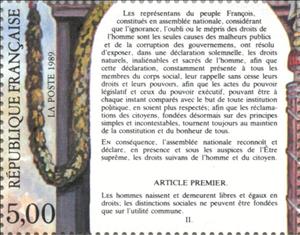Stamp: Declaration of the Rights of Man and Citizen: Preamble and A (France 1989)
Declaration of the Rights of Man and Citizen: Preamble and A (France 1989)
07 July (France ) within release French History goes into circulation Stamp Declaration of the Rights of Man and Citizen: Preamble and A face value 5 French franc
| Stamp Declaration of the Rights of Man and Citizen: Preamble and A in catalogues | |
|---|---|
| Yvert et Tellier: | Yt:FR 2596 |
| Michel: | Mi:FR 2728 |
Stamp is horizontal format.
Also in the issue French History:
- Souvenir Sheet - Declaration of the Rights of Man and Citizen face value 20;
- Mini Sheet - Declaration of the Rights of Man and Citizen face value 20;
- Stamp - Declaration of the Rights of Man and Citizen: Preamble and A face value 5;
- Stamp - Declaration of the Rights of Man and Citizen: Articles II to face value 5;
- Stamp - Declaration of the Rights of Man and Citizen: Articles VII t face value 5;
- Stamp - Declaration of the Rights of Man and Citizen: Articles XIII face value 5;
Stamp Declaration of the Rights of Man and Citizen: Preamble and A it reflects the thematic directions:
Commemorations are a type of religious observance in the many Churches of the Anglican Communion, including the Church of England. They are the least significant type of observance, the others being Principal Feasts, Principal Holy Days, Festivals, and Lesser Festivals. Whereas Principal Feasts must be celebrated, it is not obligatory to observe Commemorations. They are always attached to a calendar date, and are not observed if they fall on a Sunday, in Holy Week, or in Easter Week. In Common Worship Commemorations are not provided with collects or indications of liturgical colour. However, they may be celebrated as Lesser Festivals if local pastoral conditions suggest it.
An exposition, in the most general sense, is an organized presentation and display of a selection of items. In practice, exhibitions usually occur within museums, galleries and exhibition halls, and World's fairs. Exhibitions can include many things such as art in both major museums and smaller galleries, interpretive exhibitions, natural history museums and history museums, and also varieties such as more commercially focused exhibitions and trade fairs.
Philately (/fɪˈlætəli/; fih-LAT-ə-lee) is the study of postage stamps and postal history. It also refers to the collection and appreciation of stamps and other philatelic products.While closely associated with stamp collecting and the study of postage, it is possible to be a philatelist without owning any stamps. For instance, the stamps being studied may be very rare or reside only in museums.
The French Revolution was a period of political and societal change in France that began with the Estates General of 1789 and ended with the Coup of 18 Brumaire on 9 November 1799. Many of the revolution's ideas are considered fundamental principles of liberal democracy,and its values remain central to modern French political discourse. It was caused by a combination of social, political, and economic factors which the existing regime proved unable to manage.
An anniversary is the date on which an event took place or an institution was founded in a previous year, and may also refer to the commemoration or celebration of that event. For example, the first event is the initial occurrence or, if planned, the inaugural of the event. One year later would be the first anniversary of that event. The word was first used for Catholic feasts to commemorate saints. Most countries celebrate national anniversaries, typically called national days. These could be the date of independence of the nation or the adoption of a new constitution or form of government. The important dates in a sitting monarch's reign may also be commemorated, an event often referred to as a "Jubilee".




